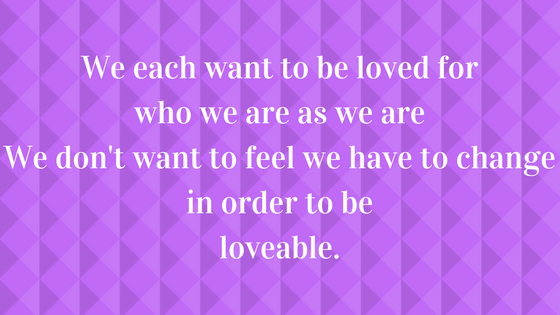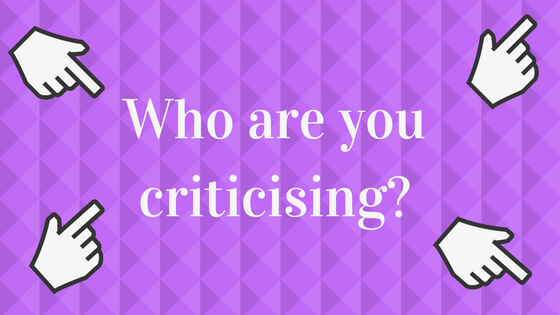Most of us don’t like being criticised, yet we criticise others regularly.
Whether we verbalise the criticism or internalise it, it can have a significant detrimental impact on our relationships.
We want others to change, to behave the way we think they should behave, to do what we think they should do, to be more like us………
And yet internally at the same time we’re critical of ourselves.
We often try to be more accepting of the behaviour of others to benefit our connection with them, but we only succeed in burying resentment, which has the same damaging effect on the relationship.
So how do we reduce our criticism of others?
The following steps have worked time and again for my clients and for myself, so I recommend you try them.
-
When you have the urge to criticise someone, think about where you display that same behaviour. Whatever it is that you are criticising, ask yourself “Where do I do the same or something similar?”
It’s not always in the same form.
For example, you may be critical of someone you perceive to be stingy with money. Look at where are stingy. It might be that you withhold your time, energy or praise.
And if you look further you’ll find the times that you don’t want to spend money where others do. We like to spend on things that are important to us, so we will be ‘stingy’ if friends or family want us to spend on things they see as important that we don’t.
If you’re annoyed at colleagues who you perceive aren’t working effectively, look at work habits.
Perhaps you have areas of your work that you avoid and delay while busying yourself with other jobs that are easier to do?
If the messy habits of others irritate you, look at where you are messy.
Are you messy in your speech instead of your home – do your words ramble all over the place so that people can’t follow your thoughts?
If you are critical of ‘selfishness’ in someone else – look to see how you are ‘selfish’ (‘selfish’ just means doing what’s important to you but that’s another story…!)
Do you let others tackle difficult issues with family members?
Do you hog the TV remote?
If you take a few moments to examine your own behaviour, you’ll find you do the same thing you’re criticising in others.
In the bible there is a story about a crowd of people preparing to stone a woman for her transgressions. Jesus said to them “Let those amongst you without sin cast the first stone”.
The modern equivalent is that “People who live in glass houses shouldn’t throw stones”.
I would add to the above, if you’re being critical of someone else, take some time to reflect on your own actions.
2. Look at the behaviour that is annoying you. Then ask yourself “What am I learning or gaining from that behaviour?”
-
Are you learning to draw boundaries because of how they behave? To value your time and efforts more?
-
Do you gain a perspective on the world you would otherwise miss out on? Does their behaviour help you to appreciate the unique gifts of others and perhaps to value your own gifts more?
-
Have you learnt to stay focused on your goals instead of trying to please them?
-
Has conflict arising from their behaviour meant that your communication skills have improved? Has this helped your work and personal relationships?
-
Perhaps you have learnt to be more patient, resilient or creative in the face of challenges?
3. Take some time to look at when you have exhibited the behaviour you don’t like in them.
Since we criticise in others what we haven’t learned to love in ourselves, it means that we feel some guilt or shame about our own behaviour in the past, so we bury that and criticise others for behaving that way.

If we explore those times in the past, we can bring our memories into balance.
Then we can be less critical of others and of ourselves.
Go back to a time you have done what you are criticising in them. Who was it towards? Reflect on how that person benefited from your behaviour.
-
Did they learn to stand up for themselves and what was important to them
-
Did they learn to be more creative or resilient?
-
Were they able to become clearer about not having to please others?
-
Did they become more focused on their own goals because of your behaviour?
If we feel guilty about events of the past, we react to events in the present.
If we bring the past events into balance, we can become present in the moment now.
We can respond instead of reacting.
The more we can live in the present moment, the greater the gratitude and fulfilment we can experience in our lives and our relationships.
We each want to be loved for who we are, as we are.
We don’t want to feel we have to change in order to be loveable.
Contact me if you’d like some further tips on completing the above steps to bring more balance into your life.
 Contact me if you’d like some further tips on completing the above steps to bring more balance into your life.
Contact me if you’d like some further tips on completing the above steps to bring more balance into your life.


